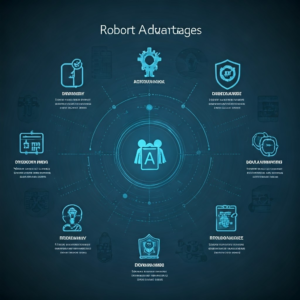Introduction
In today’s digital world, we generate, share, and store a lot of data. This makes data protection and privacy very important. As artificial intelligence (AI) becomes part of our everyday lives, it brings new chances and issues for data protection. This blog looks at how artificial intelligence is changing data protection. It helps organizations keep sensitive information safe while dealing with changing privacy regulations.
Understanding AI’s Role in Data Protection

Artificial intelligence is changing how we protect data. It improves old security methods and adds new ways to defend against threats. AI can quickly find and react to dangers, helping companies keep safe from new cyber risks.
This technology helps businesses automate important data protection tasks. This saves time for workers and helps them do their jobs better. AI also makes it easier to find and fix weaknesses. It can automate how data is classified and improve defenses against phishing and malware. Overall, AI gives a strong way to data protection and increases security everywhere.
The Fundamental Mechanisms of AI in Enhancing Privacy
AI is great at analyzing big data to find patterns, especially for data protection. It helps identify and organize personal information efficiently. By eliminating unnecessary data, AI reduces risks in case of a breach. Organizations using AI can handle privacy issues better and comply with data protection rules. AI equips them to manage personal data protection effectively, creating a safer online environment focused on privacy.
How AI Algorithms Transform Data Security
Artificial Intelligence (AI) transforms data protection and Security. It shifts from reacting to proactively preventing issues. AI quickly detects anomalies and suspicious patterns, enhancing threat identification speed. Through machine learning, AI evolves to combat new security risks, outsmarting cyber threats. AI enhances access control with advanced authentication methods and risk-based controls. By analyzing user behavior, AI identifies unusual actions and warns against unauthorized access attempts, ensuring data protection.
The Impact of AI on Data Classification and Management

The vast data organizations deal with today is challenging to handle manually. Artificial intelligence (AI) helps by organizing and safeguarding data efficiently. AI systems automate data classification, ensuring sensitive information receives appropriate security measures. Additionally, AI assists in complying with data protection regulations by automating archiving or deletion based on guidelines and laws.
Automating Data Classification with AI Technologies
Data sorting is crucial for good data protection. It finds and shields important details. AI, notably machine learning, automates this task, saving time and enhancing accuracy. AI systems can analyze vast data sets, identifying and grouping sensitive data using learned patterns, reducing manual work and errors. AI adapts to new data trends and rules, ensuring up-to-date practices for data protection. This adaptive method helps organizations defend against threats and maintain strong security.
Strategies for Managing Sensitive Data Using AI
Managing important information is crucial. It maintains data protection and follows privacy rules. AI provides new ways to enhance data protection. This is especially useful for controlling data access and reducing data collection.
AI creates specific access rules. It allows people to access sensitive data based on their roles and activities. AI monitors access patterns too. If it detects anything suspicious, it alerts us to prevent unauthorized entry.
Moreover, AI aids in minimizing data. It locates and deletes unnecessary data. By doing this, organizations have less data, reducing risks of exposure. These actions enhance data protection and ensure privacy compliance.
AI-driven Solutions for Phishing and Malware Defense

Phishing attacks and malware infections are big threats to data protection. They often take advantage of human weaknesses to get sensitive information. Artificial intelligence is important for improving defenses against these changing threats. It adds smart ways to detect and prevent problems.
AI security solutions can look at large amounts of data. They help find phishing patterns in emails, websites, and other forms of communication. By spotting small signs and unusual behavior, these systems can warn users and stop potential phishing attempts. This protects users from scams and helps prevent data protection breaches.
Identifying and Neutralizing Phishing Attempts with AI
Phishing attacks copy real messages, threatening people and companies. AI helps stop these attacks, protecting data Protection. It studies emails to find suspicious patterns indicating possible phishing. AI uses past data to spot and block threats effectively.
Additionally, AI helps educate people about phishing tricks, encouraging caution before sharing private information online. By teaching individuals to identify and dodge scams, AI improves online safety.
Utilizing AI to Prevent Malware Infiltrations
As hackers make more dangerous malware, old data protection methods fail. Artificial intelligence detects and stops malware better. It checks file behavior, monitors networks, and reviews system actions to identify harmful software. Machine learning helps AI adapt to new malware types for strong data protection.
When a malware attack occurs, AI aids in recovery by assessing the issue’s magnitude, isolating affected systems, and restoring lost data from backups. This speeds up recovery processes and minimizes downtime.
The Necessity of Data Security in AI Systems

Artificial intelligence can enhance data security. AI systems must be secure too. With vast data use, AI systems attract hackers seeking sensitive information. Robust data security protocols are vital in AI systems to maintain data privacy and reliability. Protecting algorithms, data flows, and access points in AI is as crucial as safeguarding traditional IT systems.
Challenges in Securing AI Algorithms
Securing AI is tricky due to unique challenges. Protect algorithms from unauthorized access and changes. One challenge is securing training data for AI models. Hacked data can lead to biased results. Secure data storage and access controls are vital.
Guard against adversarial attacks on AI. Bad actors give fake data to trick systems. Use methods like adversarial training and anomaly detection to strengthen AI systems and increase reliability.
Ensuring Integrity and Confidentiality of AI Systems
Maintaining AI security is crucial for its performance and ethical behavior. Data accuracy ensures correct information. Organizations must verify data integrity during AI processing. Regular system checks are essential to maintain trust in AI results.
Data privacy issues can be addressed with encryption and access controls. Protect sensitive data managed by AI. Collect and retain only essential data to minimize security risks if a breach occurs.
Customizing AI for Industry-Specific Data Security Challenges

Industries such as healthcare, finance, and government face unique security challenges due to handling sensitive data. AI solutions can be customized for each sector to enhance data protection. For instance, in healthcare, AI safeguards patient information, secures medical tools, and identifies fraudulent insurance claims. In finance, AI combats fraud, shields customer financial data, and adheres to industry regulations.
Addressing Healthcare Sector Vulnerabilities
The healthcare sector has sensitive data, making it a target for cyber attacks. Protecting personal health information is crucial. AI provides tools to strengthen security in this area.
AI security solutions monitor network traffic for unusual activities, which could indicate data breach attempts. By analyzing patterns and anomalies, these systems detect breaches promptly, enabling quick response from healthcare organizations to minimize harm.
Moreover, AI can anonymize patient data by replacing identifying information with unique IDs. This safeguards patient privacy while facilitating medical research using the data.
Protecting Financial Services from Cyber Threats with AI
Financial firms have crucial data attracting cyber crooks. AI aids in cyber defense, detecting fraud and securing data. AI tracks transactions, habits, and networks to catch fraudulent actions promptly, safeguarding accounts. It also enhances security by monitoring data access and internal threats, bolstering financial safety.
Regulatory Compliance and AI: Navigating Through the Complex Landscape
Data protection rules are getting harder to understand and follow. This is a big challenge for companies trying to stay in line with the law. Artificial intelligence can help businesses deal with these tough rules. It can help them meet regulatory requirements and improve data security.
AI solutions can take care of compliance tasks. These tasks include data mapping, checking for risks, and enforcing policies. These systems can look at data and find places where compliance is weak. They can also suggest ways to fix issues. This makes the compliance process easier and lowers the chances of facing expensive penalties.
GDPR and AI: Ensuring Compliance in Data Protection
The GDPR has strict rules to protect personal data, affecting organizations worldwide. Complying with these rules is vital for trust and avoiding fines.
AI assists in meeting GDPR standards by aiding in identifying and marking personal data. It helps with assessments and managing data requests.
Automation by AI simplifies compliance, reduces errors, and lets organizations focus on business operations while meeting GDPR.
The Role of AI in Adhering to Dubai’s Data Protection Regulations
Dubai has Data Protection rules similar to GDPR. They guide safeguarding personal data. Organizations in Dubai or handling such data must comply. Failure could lead to legal issues and reputational damage.
AI aids these organizations in meeting regulations. It simplifies tasks like data mapping, consent management, and breach detection/reporting, enhancing compliance efforts.
With AI, Dubai’s organizations grasp local privacy laws better. This enables improved protection of personal information and adherence to Data Protection rules in Dubai.
Advanced AI Techniques for Data Security

As cyber threats grow more complex, old data security measures often don’t work well. To protect themselves from bad actors, organizations are using advanced AI techniques for better data security.
Advanced AI programs are trained on large sets of information about cyber threats. This helps them spot and react to complicated attack patterns that older security systems miss. Methods like anomaly detection and behavioral analysis allow AI to find and stop threats instantly. This gives a smart way to handle cybersecurity
Leveraging Machine Learning for Anomaly Detection
Anomaly detection is crucial in machine learning. It identifies security threats by detecting abnormal patterns. Continuous data monitoring alerts security teams about unusual activities promptly, enabling quick responses to prevent data breaches.
Machine learning aids in data loss prevention (DLP) by identifying sensitive information like credit card details. DLP systems flag risky data movements, ensuring compliance with data protection regulations and safeguarding confidential data from unauthorized access.
Furthermore, machine learning enhances anomaly detection by adapting to new threats and minimizing false alarms. This results in accurate alerts for security teams to address issues promptly and maintain seamless business operations.
Enhancing Encryption Methods with AI Capabilities
Encryption keeps data private. But old methods struggle with new threats. AI improves encryption by making it smarter and stronger. AI finds and classifies important data to apply the right level of encryption. Critical data gets extra security, and less important data is encrypted easily.
AI helps in managing encryption keys, crucial for security. By automating tasks like key changes, storage, and access control, AI minimizes key loss risks. This enhances data privacy through improved encryption methods.
Data Lifecycle Management in AI Systems
Data lifecycle management is very important. It makes sure that data is managed safely and properly from the start to the end. This includes collecting, storing, processing, and finally deleting data. For AI systems, it is even more critical. These systems need a lot of data to work.
By adding data security steps at every part of the data lifecycle, organizations can lower the chance of data breaches. They can also follow privacy regulations. This helps keep the data safe and private while it’s being used by AI systems.
Securing Data Across All Phases of AI Processing
Data management with AI adds security measures for all data handling parts. It safeguards sensitive information and complies with privacy regulations. Each data handling step requires specific security protocols, from collection to deletion.
During data gathering, organizations employ access controls and encryption methods to secure data in motion and at rest. Safe storage solutions such as encrypted databases and secure cloud storage are essential to prevent unauthorized access.
When utilizing data in AI systems, consider using data masking and tokenization to safeguard sensitive information during analysis. Implement access controls and audit trails to monitor data access and alterations effectively.
Implementing AI in Data Erasure and Destruction Processes
Securely deleting and destroying data is crucial for security. It ensures sensitive information is permanently removed when unnecessary or legally mandated. AI enhances this process by boosting efficiency and compliance with data protection laws.
AI tools can automate locating and erasing sensitive data on various devices. These tools use machine learning to identify patterns and keywords indicating sensitive information’s location. Thus, they can erase all vital data, even if it’s spread across different formats.
The use of AI in data destruction enhances security by verifying erasure effectiveness and maintaining compliance records. This automation reduces errors, enhances security, and simplifies safe disposal of sensitive information.
Maximizing the Benefits: Key Advantages of Robust AI Data Security

In the modern world, digital changes are widespread. AI data security is crucial now. Focusing on data security in AI projects brings various benefits. It safeguards reputation, boosts customer trust, and ensures compliance with laws.
Effective AI data security measures enable organizations to maximize artificial intelligence. This, in turn, minimizes risks associated with handling sensitive data.
Strengthening Data Privacy Measures
Strong data protection is crucial for ethical AI. Organizations earn trust by safeguarding personal information. Following privacy laws builds a culture valuing privacy. AI enhances privacy by sorting data automatically. This determines necessary protection levels based on sensitivity. Identifying and removing redundant data minimizes privacy risks. Techniques like differential privacy and encryption strengthen AI privacy. These methods allow data analysis without exposing personal information, ensuring privacy while gaining insights.
Boosting Efficiency in Data Protection Efforts
Ai improves data protection by saving time and resources for security tasks. Teams can focus on essential goals, enhancing security and business operations. Ai-based systems analyze security data from various sources, identifying and linking events to detect threats promptly. This speeds up incident responses, reducing damage and downtime caused by security issues.
Moreover, Ai enhances data security by identifying vulnerabilities and recommending ways to improve protection. Constant monitoring and detection of unusual activities enable companies to address security issues proactively. This ensures smooth business operations, preventing expensive problems.
Overcoming Obstacles: Addressing AI Security Challenges
Artificial intelligence helps with data security but has challenges like attacks and bias. Organizations must address these issues by enhancing security, fostering teamwork, and promoting a security-focused culture to leverage AI advantages while minimizing risks.
Mitigating Risks of Data Breaches in AI Platforms
Data breaches harm AI platforms trust. To protect data and secure AI, risk management is crucial. Organizations must safeguard AI by securing storage, processing, and communication. They should use controls, encryption, and detection to prevent unauthorized access.
Regularly testing security systems is vital to address new threats. Penetration testing finds weaknesses and strengthens AI platforms. Organizations must update security measures continually to enhance protection against vulnerabilities in the systems.
Counteracting the Sophistication of Cyber-Attacks with AI
The rise in cyber-attacks means we need stronger ways to defend ourselves. AI is a key player in this fight. It helps us deal with new threats and keep our important digital data safe.
Here’s how it works:
- Predictive analysis: AI systems can take a lot of data on threats and use it to guess and prepare for new types of attacks.
- Behavioral analysis: AI learns what regular users and systems do. It can spot unusual actions that might show bad activities.
- Automated incident response: AI can quickly find, study, and tackle problems as they happen, reducing possible harm.
Using these smart tools, AI helps groups stay ahead of bad actors. It makes their defenses stronger and lowers the risks from tough cyber threats.
Adopting Best Practices for AI in Data Security
Integrating AI into your data security plan needs a clear method. Using best practices helps make sure that AI improves your security instead of hurting it. First, you should set up a strong data management plan that includes special rules for AI.
Regularly check your AI systems for weaknesses. Look at factors such as data integrity, fairness in algorithms, and who has access. Keeping up with new AI security threats and adding safety measures is a long-term task. This will help keep your protections strong.
Comprehensive Data Governance Frameworks
AA solid data plan is vital for AI data safety. It manages data well, keeping it secure and ethical. The plan should clarify data rules like access, use, storage, and deletion. Identifying data owners and security overseers is crucial.
Incorporating AI security into these plans allows for top-notch measures like encryption and access controls. These steps ensure privacy protection. A good data plan supports responsible AI growth, fostering trust with stakeholders and meeting regulations.
Continuous Monitoring and Real-Time Threat Detection
In today’s fast-changing threat environment, keeping an eye on AI systems and spotting threats in real-time is very important to stay safe. Old security measures are often too slow and do not work well against the fast and clever cyberattacks we see now.
AI-based security tools are really good at gathering and analyzing large amounts of information from different places. They can find unusual behavior and patterns that could show a security issue. Quick threat detection allows organizations to act fast, reducing harm and downtime.
When organizations use continuous monitoring and AI, they can deal with threats before they happen. This helps improve response times and lessen the effects of security breaches on their AI systems and sensitive data.
The Future of AI in Data Security: Trends and Predictions
The mix of AI and data security offers a promising future. In this future, smart systems will learn and adjust to protect our digital assets. Both businesses and people can expect better AI security solutions. These are made to stay ahead of the changing strategies of cyber threats.
Think about a future where AI can find and stop threats by itself. It can fix weak spots before they are misused. This will lead to a new way of working in cybersecurity that is proactive and smart. As AI continues to improve, it will enhance our data security. This will lead to a safer and more secure digital space.
The Emergence of Autonomous Security AI Systems
Artificial intelligence is changing data security. Self-learning systems can detect and respond to threats independently, reducing human intervention. AI monitors network activity, analyzes behavior, and identifies risks autonomously. This speeds up incident responses and minimizes security breaches. Future AI systems are expected to predict and prevent threats proactively.
AI’s Role in Shaping Next-Generation Cybersecurity Measures
Artificial intelligence (AI) enhances cybersecurity and develops advanced tools for online safety by setting traps using deception technology. These traps mislead attackers, safeguarding vital assets and providing security teams with more time and better insights.
AI’s ability to analyze vast data quickly is crucial for creating effective security systems like SIEM. These systems detect even subtle threats in complex IT environments, enhancing overall protection.
The continuous progress of AI is pivotal for the future of cybersecurity, becoming essential for organizations to ensure the safety of their data, systems, and trust in an increasingly complicated and risky world.
Conclusion
In conclusion, AI is changing how we protect sensitive information and privacy. It helps improve privacy methods. AI also automates how we sort data and fights against online threats using new technology. This change is important for data protection and security. Organizations can use best practices to stay safe from new risks. By using AI, they can boost their data defenses. As we look at changing rules and trends, using AI for strong data security is essential to keep things safe and in line with regulations. If you want to find the best solutions for your needs, reach out and discover how AI can help protect your valuable data assets.
Frequently Asked Questions
How Does AI Enhance Data Privacy and Security?
AI improves data privacy and security. It does this by using smart solutions. AI helps to spot threats quickly. It finds and organizes sensitive data. AI also sets rules for who can access that data. This work strengthens an organization’s security measures.
What Are the Key AI Technologies Used in Data Protection?
Key AI technologies changing data protection are machine learning algorithms that find and stop threats. They use anomaly detection to spot unusual activities. Advanced encryption methods also help keep sensitive data safe. Together, these tools make security stronger.
Can AI Completely Prevent Data Breaches?
AI helps make security measures stronger. However, it can’t remove the risk of data breaches entirely. AI improves how we detect and prevent threats. Still, human actions and changing attack methods can create challenges.
What Are the Challenges of Implementing AI in Data Security?
Using AI for data security can be tricky. It involves putting AI systems into the current setup. You also need to make sure the AI models are accurate. It’s important to deal with any biases that might be in the AI algorithms.
How Is Dubai Leveraging AI for Data Protection?
Dubai is leading the way in using AI to protect data. You can see this in its strong rules and guidelines. The city is also investing in AI security tools. Plus, it is dedicated to encouraging new ideas in data privacy and cybersecurity

